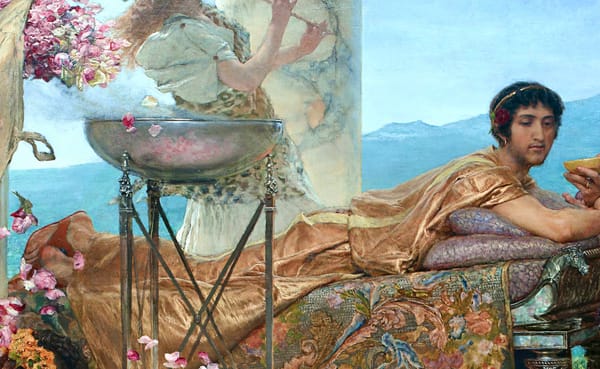Shadows Over Rome
A story of plot and intrigue that resulted in the assassination of one of the most iconic figures of the Roman Empire.

Disclaimer
This story is based on historical figures, but is ultimately a work of fiction. We're a small team of human writers, fascinated with Ancient Rome and its myriad myths and legends. Narrating fantastical stories to each other started as a hobby; and with the help of AI tools, we are able to share our passion with the rest of the world. We wholeheartedly wish you enjoy our craft – Carpe diem.
In the heart of ancient Rome, the year 44 BC marked a turning point in the annals of history. It was a time of political intrigue, soaring ambitions, and a republic on the brink of transformation. At the center of this maelstrom stood Gaius Julius Caesar, a figure both revered and feared, a man who had crossed the Rubicon not just literally, but also in the hearts and minds of the Roman Senate.
Julius Caesar, the conqueror of Gaul, the victor of the Civil War, had risen to unprecedented heights. His return to Rome was triumphant, yet it sowed the seeds of a silent conspiracy among those who saw in his glory the death of the Republic. The Senate's hallowed halls, once the bedrock of Roman governance, now trembled under the shadow of a single man's power.
Among the ranks of the senators, whispers of dissent began to take form. Key figures like Gaius Cassius Longinus and Marcus Junius Brutus, men of noble lineage and staunch republicans, viewed Caesar's increasing power as a threat to the freedoms Rome had long cherished. Their loyalty to the Republic outweighed their personal ties to Caesar, setting the stage for a plot that would echo through the ages.
The conspiracy against Julius Caesar began to take shape against a backdrop of political and personal tensions. Key moments that contributed to the growing resentment against Caesar and set the stage for the conspiracy included several incidents that highlighted his perceived arrogance and disregard for Roman republican traditions.
The background story
One notable incident occurred in December 45 BC or early 44 BC when Caesar, after receiving numerous honors from the Senate, failed to stand up to greet the senators at the Temple of Venus Genetrix. This act was seen as a blatant disregard for senatorial authority and Roman etiquette. Another critical moment happened in January 44 BC, when a diadem was discovered on the statue of Caesar in the Roman Forum, symbolizing royalty. Although Caesar denied any monarchical ambitions, this act further fueled suspicions among the senators.
The plot to assassinate Caesar began to form in earnest with a meeting between Cassius Longinus and Marcus Brutus on the evening of February 22, 44 BC. Both men agreed that drastic measures were needed to prevent Caesar from becoming a king. They started recruiting other senators for their cause, carefully choosing individuals who shared their views and could be trusted. Notable among the conspirators were Pacuvius Labeo, Decimus Brutus, Gaius Trebonius, Tillius Cimber, Minucius Basilus, the brothers Casca, and Pontius Aquila. Each of these men had their reasons for joining the plot, ranging from ideological beliefs to personal grievances against Caesar.

The conspirators aimed to recruit enough men to surround Caesar and fight his supporters but not so many that they risked discovery. They assessed potential recruits with innocent-sounding questions, eventually gathering around sixty to eighty participants. Discussions also included whether to involve Cicero and Mark Antony. Cicero was considered too cautious, while Antony, having previously rejected a proposal to join a conspiracy, was ultimately excluded.
The conspirators did not meet openly but assembled secretly at each other's homes and in small groups. As the Ides of March approached, the conspirators, now numbering over forty, finalized their grim resolve. They would strike at Caesar in the very heart of Rome's democratic institution: the Senate.
The day of doom
The morning of March 15, 44 BC, (the Ides of March), dawned like any other in the city of Rome, yet it was a day that would be etched in history for the dramatic events that were to unfold. Julius Caesar, the dictator of Rome, awoke in his residence in the heart of the city, unaware that it would be his last day.
Despite the warnings and omens that had foretold of potential danger, including a vivid nightmare experienced by his wife, Calpurnia, who dreamt of his death and pleaded with him to stay home, Caesar chose to attend the Senate meeting. His decision, influenced perhaps by a blend of belief in his own invincibility and the dismissal of superstitions common to Roman leaders, led him to fatefully set aside his wife's fears.
As Caesar prepared for the day, Rome was bustling with its usual vibrancy. The streets were filled with merchants opening their shops, patricians and plebeians alike going about their business, and the ever-present political machinations that characterized the Roman political landscape.
Meanwhile, the conspirators, led by Cassius and Brutus, were finalizing their plans. They had decided to carry out the assassination in the Theatre of Pompey, where the Senate meeting was to be held. This location was chosen instead of the Curia in the Roman Forum due to the reconstruction following a fire. The conspirators mingled with other senators, hiding their trepidation and resolve beneath a veneer of normalcy.
Back at Caesar's residence, his friends and advisors gathered, as was customary before his departure to the Senate. Among them was Decimus Brutus, one of the conspirators, who played a crucial role in persuading Caesar to leave his house despite the ominous signs. Decimus downplayed Calpurnia's fears and convinced Caesar that not attending the Senate would be seen as an act of cowardice and a slight to the institution he had worked so hard to control.
As Caesar made his way to the Senate, the city of Rome continued its daily rhythm, oblivious to the fact that it was on the cusp of a pivotal historical moment. The streets were alive with the chatter of citizens, the clatter of carts, and the hustle of daily life. Caesar's procession through the city was a familiar sight, yet on this day, it was a journey towards an unforeseen and dramatic climax.
Upon arriving at the Theatre of Pompey, Caesar was received with the usual formalities. The conspirators, now amidst the other senators, prepared for the act that they believed was necessary to save the Republic. They were driven by a mix of fear, jealousy, and a staunch belief in the ideals of the Republic that they felt Caesar threatened.
The tension in the air was palpable as the Senate convened. Caesar took his place, surrounded by the very men who, in a few short hours, would turn from senators into assassins. The morning of the Ides of March, thus, was a portrait of contrasts - the normalcy of Roman life on the streets and the undercurrent of conspiracy and imminent betrayal within the Senate.
This day, a turning point in Roman history, began like any other in Rome, yet would end with an act that forever changed the course of Roman history and left an indelible mark on the world's collective memory. Ceasar’s arrival at the Senate House, a temporary structure near the Theater of Pompey, was met with a sense of foreboding.
Inside, the Senate awaited, a mix of trepidation and determination etched on the faces of the conspirators. As Caesar entered, the senators rose in a show of respect, masking the deadly intent that lurked beneath their togas.
The session began as any other, with debates and discussions echoing under the marble arches. But as the noon sun cast its light through the high windows, Tillius Cimber, one of the conspirators, approached Caesar with a petition. This was the agreed-upon signal. As Caesar dismissed the petition, Cimber grabbed his toga, pulling it from his neck – the act of betrayal that unleashed chaos.

In a flurry of movement, daggers drawn from the folds of senatorial robes, the conspirators descended upon Caesar. Shocked by the sudden assault, he tried to fight back, but the onslaught was relentless. Brutus, a man Caesar had treated like a son, delivered the most personal blow, both in body and spirit. As the dagger of Brutus pierced him, Caesar's last words were not a curse, but a heartbroken whisper: "Et tu, Brute?"
The Senate floor, once a place of eloquent oration and debate, was now a scene of carnage. Caesar lay still, his blood mingling with the dust of Rome, as the conspirators stood over him, their deed complete but their futures uncertain.
In the aftermath, Rome was plunged into chaos. The assassination, far from saving the Republic, hastened its end. Power struggles ensued, leading to the rise of Caesar's adopted heir, Octavian, and the formation of the Second Triumvirate with Mark Antony and Lepidus. This trio would eventually lead Rome into further civil wars, culminating in the establishment of the Roman Empire under Emperor Augustus.
The assassination of Julius Caesar remains one of history's most poignant reminders of the fine line between heroism and villainy, between the love of power and the power of love. It was an act that sought to preserve a republic but instead paved the way for an empire. In the annals of Rome, the Ides of March would forever be etched as a day when the fate of a city, a republic, and an empire were irrevocably altered by the hands of those who sought to steer the course of history, only to be swept away by its unrelenting tide.









About the Roman Empire Times
See all the latest news for the Roman Empire, ancient Roman historical facts, anecdotes from Roman Times and stories from the Empire at romanempiretimes.com. Contact our newsroom to report an update or send your story, photos and videos. Follow RET on Google News, Flipboard and subscribe here to our daily email.
Follow the Roman Empire Times on social media: